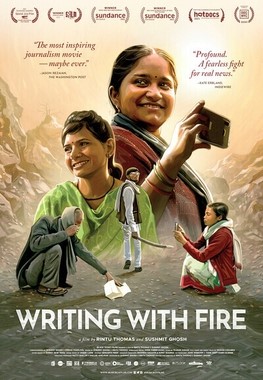
'Our story more complex than one going to Oscars': Khabar Lahariya slams documentary

The documentary, Writing With Fire, which chronicles the story of a unique rural, women- only media collective, Khabar Lahariya and the team behind it, created a stir when it was nominated for an Academy Award this year under the category of Best Documentary Feature.
Directed by debutants Rintu Thomas and Sushmit Ghosh, the documentary tells the rise of Khabar Lahariya, a digital-only rural news channel, which turned twenty this year. However, the organisation has now issued a statement criticising the filmmakers saying that the Khabar Lahariya story is far more “complex than the one going to Oscars”.
“The documentary captures a part of our story, and part stories have a way of distorting the whole sometimes,” said the statement available on their social media handles.
View this post on Instagram
The statement released by the media collective said that the film is a moving and powerful document, but its presentation of Khabar Lahariya as an organisation with a particular and consuming focus of reporting on one party and the mobilisation around this, is “inaccurate”.
“We recognise the prerogative of independent filmmakers to present the story that they choose to, but we would like to say that this eclipses the kind of work and the kind of local journalism we have done for twenty years, the reason we are different from other mainstream media of our times. It is a story which captures a part of ours, and part stories have a way of distorting the whole sometimes,” said the statement issued by the team, helmed by Dalit-led, but also Muslim, also OBC, also upper-caste women.
The 94th Academy Awards is scheduled to be held on March 28 this year.
Also read: Indian documentary ‘Writing with Fire’ on Dalit journalists nominated for Oscars
A newsroom of women with differing ideologies
The statement went on to add that they are very careful about who they “include in the frame or story, about corroboration, about multiple perspectives” and they don’t see that reflected in the film.
Adding that their newsroom has consisted of women of differing ideologies over the years, the team stated, “In 20 years, we have reported on (and befriended) many parties in Uttar Pradesh that have said they will stand for the rights of the poor, the marginalised, and we have shown them all the mirror when they have not done what they said.”
Their story hasn’t been the ‘easy-to-digest heartwarming story of the small figure talking back to the big powers’.
Instead, it has been 20 years of not knowing if they would survive and forging complex friendships and relationships on the field. Such as having tea with police officers they knew were hand in glove with the criminals they were reporting on to sitting through interviews with men with guns (and shifty glances)!
Or, being involved all these years reporting on violence against women, and “wading through mountains of FIRs, highlighting unreported cases, sitting outside postmortem rooms where families of murdered women put steep prices over dead bodies”. They have never ever revealed the identities of our subjects while identities of rape survivors have been revealed in the film, pointed out the statement.
In their reportage, they have attempted to reveal the complexity of how and why violence happens and keeps happening in our feudal, economically distraught context. “For us this – hustling for the small, local, mundane story, amplifying its significance – has been what journalism is,” said the statement, adding that in their 20 years of this “unglamorous work”, they have not known if they would survive another week, or month, or year.
And as some of their stories reach the glitz of Academy Awards luncheon parties – they feel vulnerable. “We have not, as the film would have one believe, been able to carry our caste identities on our sleeves, with bravado and humour. We have had to be discreet, often fearful. And even if we have written and reported from our particular caste identities, we have upheld the right to protect our families’ privacy, especially our children’s, who will come into these battles in their own ways,” the statement added.
The documentary Writing with Fire has picked up good reviews on the festival circuit. A New York Times review had said: “And at a time when the profession faces increasing dangers in India, the film’s faith in the powers of grassroots journalism is nothing short of galvanizing”.
When the film was nominated for the Oscars in February, Khabar Lahariya had congratulated the team and hoped that they would continue to support their work. But the team claimed in their recent statement that they watched the entire film as an organisation recently and would like to make their views on the film clear.

